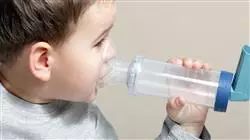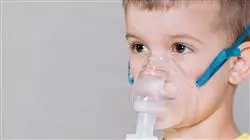University certificate
The world's largest faculty of physiotherapy”
Introduction to the Program
A complete and practical Postgraduate diploma that will allow you to learn in a real and direct way everything you need to work as a physiotherapist"

The disciplinary consideration of respiratory physiotherapy with a scientific-technical basis began in the late twentieth century, thanks to technological advances that allow measuring respiratory work and techniques, and is currently becoming necessary and essential in different hospital units. Therefore, it is essential that physical therapists update their knowledge in respiratory physiotherapy and acquire new techniques and tools to apply in their daily practice.
Physiotherapy is considered one of the therapeutic pillars in the management of patients with pulmonary diseases, whether obstructive or restrictive, chronic or acute.
The increase in the incidence of respiratory pathologies that we are going to see during this Postgraduate diploma, both in children and adults, considerably affects the quality of life of the patients who suffer from them, as well as our health system, with a high social and economic cost due to hospitalization days, sick leave and early death.
The Postgraduate diploma has a teaching staff specialized in respiratory physiotherapy, who contribute both their practical experience in their day-to-day work in private practice, as well as their lengthy experience in teaching at national and international level. In addition, it has the advantage of being a 100% online specialization, so the student can decide from where to study and at what time to do it, this way, they can flexibly self-direct their study hours.
Get up to date in all the latest developments in the field of physiotherapy by completing the most effective Postgraduate diploma in this field available on the market"
This online Postgraduate diploma offers you the benefits of a scientific, teaching and technological high-level course. These are some of its most notable features:
- Latest technology in online teaching software
- Highly visual teaching system, supported by graphic and schematic contents that are easy to assimilate and understand
- Practical cases presented by practising experts
- State-of-the-art interactive video systems
- Teaching supported by telepractice
- Continuous updating and recycling systems
- Self-regulating learning: full compatibility with other occupations
- Practical exercises for self-evaluation and learning verification
- Support groups and educational synergies: questions to the expert, debate and knowledge forums
- Communication with the teacher and individual reflection work
- Content that is accessible from any fixed or portable device with an Internet connection
- Supplementary documentation databases are permanently available, even after the course
An effective and reliable Postgraduate diploma that will take you through an interesting and efficient learning process so that you acquire all the knowledge of an expert in the field"
Our teaching staff is made up of working professionals. In this way we ensure that we deliver the educational update we are aiming for. A multidisciplinary team of professionals specialization and experienced in different environments, who will cover the theoretical knowledge in an efficient way, but, above all, will put the practical knowledge derived from their own experience at the service of the course: one of the differential qualities of this program.
This mastery of the subject is complemented by the effectiveness of the methodological design of this Postgraduate diploma. Developed by a multidisciplinary team of e-learning experts, it integrates the latest advances in educational technology. In this way, you will be able to study with a range of easy-to-use and versatile multimedia tools that will give you the necessary skills you need for your specialization.
The design of this program is based on Problem-Based Learning: an approach that conceives learning as a highly practical process. To achieve this remotely, we will use telepractice: with the help of an innovative interactive video system, and learning from an expert, you will be able to acquire the knowledge as if you were actually dealing with the scenario you are learning about. A concept that will allow you to integrate and fix learning in a more realistic and permanent way.
Our innovative telepractice concept will give you the opportunity to learn through an immersive experience, which will provide you with a faster integration and a much more realistic view of the contents: “learning from an expert”

With a methodological design based on proven teaching techniques, this Postgraduate diploma will take you through different teaching approaches to allow you to learn in a dynamic and effective way"
Why study at TECH?
TECH is the world’s largest online university. With an impressive catalog of more than 14,000 university programs available in 11 languages, it is positioned as a leader in employability, with a 99% job placement rate. In addition, it relies on an enormous faculty of more than 6,000 professors of the highest international renown.

Study at the world's largest online university and guarantee your professional success. The future starts at TECH”
The world’s best online university according to FORBES
The prestigious Forbes magazine, specialized in business and finance, has highlighted TECH as “the world's best online university” This is what they have recently stated in an article in their digital edition in which they echo the success story of this institution, “thanks to the academic offer it provides, the selection of its teaching staff, and an innovative learning method aimed at educating the professionals of the future”
A revolutionary study method, a cutting-edge faculty and a practical focus: the key to TECH's success.
The most complete study plans on the university scene
TECH offers the most complete study plans on the university scene, with syllabuses that cover fundamental concepts and, at the same time, the main scientific advances in their specific scientific areas. In addition, these programs are continuously being updated to guarantee students the academic vanguard and the most in-demand professional skills. In this way, the university's qualifications provide its graduates with a significant advantage to propel their careers to success.
TECH offers the most comprehensive and intensive study plans on the current university scene.
A world-class teaching staff
TECH's teaching staff is made up of more than 6,000 professors with the highest international recognition. Professors, researchers and top executives of multinational companies, including Isaiah Covington, performance coach of the Boston Celtics; Magda Romanska, principal investigator at Harvard MetaLAB; Ignacio Wistumba, chairman of the department of translational molecular pathology at MD Anderson Cancer Center; and D.W. Pine, creative director of TIME magazine, among others.
Internationally renowned experts, specialized in different branches of Health, Technology, Communication and Business, form part of the TECH faculty.
A unique learning method
TECH is the first university to use Relearning in all its programs. It is the best online learning methodology, accredited with international teaching quality certifications, provided by prestigious educational agencies. In addition, this disruptive educational model is complemented with the “Case Method”, thereby setting up a unique online teaching strategy. Innovative teaching resources are also implemented, including detailed videos, infographics and interactive summaries.
TECH combines Relearning and the Case Method in all its university programs to guarantee excellent theoretical and practical learning, studying whenever and wherever you want.
The world's largest online university
TECH is the world’s largest online university. We are the largest educational institution, with the best and widest online educational catalog, one hundred percent online and covering the vast majority of areas of knowledge. We offer a large selection of our own degrees and accredited online undergraduate and postgraduate degrees. In total, more than 14,000 university degrees, in eleven different languages, make us the largest educational largest in the world.
TECH has the world's most extensive catalog of academic and official programs, available in more than 11 languages.
Google Premier Partner
The American technology giant has awarded TECH the Google Google Premier Partner badge. This award, which is only available to 3% of the world's companies, highlights the efficient, flexible and tailored experience that this university provides to students. The recognition as a Google Premier Partner not only accredits the maximum rigor, performance and investment in TECH's digital infrastructures, but also places this university as one of the world's leading technology companies.
Google has positioned TECH in the top 3% of the world's most important technology companies by awarding it its Google Premier Partner badge.
The official online university of the NBA
TECH is the official online university of the NBA. Thanks to our agreement with the biggest league in basketball, we offer our students exclusive university programs, as well as a wide variety of educational resources focused on the business of the league and other areas of the sports industry. Each program is made up of a uniquely designed syllabus and features exceptional guest hosts: professionals with a distinguished sports background who will offer their expertise on the most relevant topics.
TECH has been selected by the NBA, the world's top basketball league, as its official online university.
The top-rated university by its students
Students have positioned TECH as the world's top-rated university on the main review websites, with a highest rating of 4.9 out of 5, obtained from more than 1,000 reviews. These results consolidate TECH as the benchmark university institution at an international level, reflecting the excellence and positive impact of its educational model.” reflecting the excellence and positive impact of its educational model.”
TECH is the world’s top-rated university by its students.
Leaders in employability
TECH has managed to become the leading university in employability. 99% of its students obtain jobs in the academic field they have studied, within one year of completing any of the university's programs. A similar number achieve immediate career enhancement. All this thanks to a study methodology that bases its effectiveness on the acquisition of practical skills, which are absolutely necessary for professional development.
99% of TECH graduates find a job within a year of completing their studies.
Postgraduate Diploma in Pediatric Respiratory Physiotherapy and its Assessment
Every 39 seconds a child dies in the world due to pneumonia, according to data from UNICEF, WHO and the Maternal and Child Epidemiological Estimation Group (MCEE). This gives us an idea of how complex the issue of respiratory diseases in pediatric patients is and how much physiotherapy can contribute to their intervention. An update in bronchopulmonary pathophysiology, as well as in its different diagnostic and treatment techniques, is essential to exercise a quality praxis and, why not, to open the way to new job opportunities. For this reason, TECH Global University offers the Postgraduate Diploma in Pediatric Respiratory Physiotherapy and its Assessment, a fully online Postgraduate Diploma that brings together the most outstanding instructors, teaching methodologies and educational technology to provide a unique experience. As for the syllabus, you will find throughout three blocks, topics such as: bronchiolitis, aerosol therapy in pediatrics, spirometry, autogenous drainage, nasal lavage, ventilatory biomechanics and much more. Looking to become a physiotherapist at a high level? Opt for TECH.
Study an online postgraduate course in pediatric respiratory physiotherapy.
Have you heard about the technique of induced cough? It is a very practical procedure within respiratory physiotherapy used mainly in patients who have bronchial problems; its purpose is to evacuate the accumulated mucous secretions that hinder proper breathing in the patient. Here in our Postgraduate Diploma we will teach you not only about this particular method, but also about other non-instrumental techniques of infant respiratory physiotherapy such as the Slow Total Expiratory Total Slow Expiratory with Open Glotis in Infra-lateral (ELTGOL). Likewise, you will learn how to adapt these dynamics to patients with brain damage. A whole compendium of exclusive knowledge dispensed in a convenient format of self-regulated classes that you can access from the place and device of your choice. Enroll in TECH and discover a way to become a professional that will transcend your expectations.







